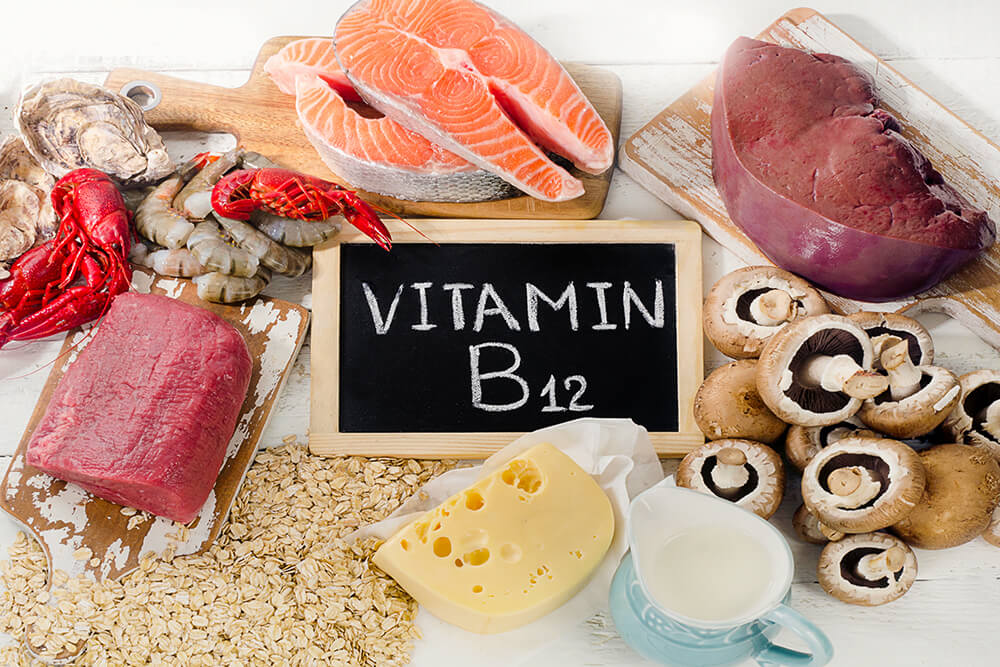Vitamin B12 Brilliance: Nourishing Well-Being Vitamin B12 Brilliance - Essential Insights for Optimal Well-Being – Our Guide to Unlocking Nutritional Vitality and Health.

In the realm of essential nutrients, Vitamin B12 stands out as a key player crucial for maintaining optimal health. This water-soluble vitamin, also known as cobalamin, plays a vital role in various bodily functions, from supporting the nervous system to aiding in the production of red blood cells. As we delve into this comprehensive guide, we will explore not only how to increase Vitamin B12 levels through dietary choices, supplements, and injections but also the potential consequences one may face in its deficiency. Join us on a journey to understand the significance of Vitamin B12 and discover practical strategies to ensure your well-being.
Consequences of Vitamin B12 Deficiency

- Anemia:
- B12 deficiency can lead to megaloblastic anemia, a condition where red blood cells are larger than normal, affecting oxygen transport.
- Neurological Issues:
- Prolonged deficiency may cause neurological problems, such as numbness, tingling, and difficulty with coordination and balance.
- Fatigue and Weakness:
- Insufficient B12 levels can result in persistent fatigue, weakness, and a general lack of energy.
- Cognitive Impairment:
- Long-term deficiency may impact cognitive function, leading to memory loss, difficulty concentrating, and mood disturbances.
- Digestive Problems:
- B12 deficiency can affect the digestive system, causing symptoms like constipation, loss of appetite, and weight loss.
- Increased Risk for Certain Conditions:
- Untreated deficiency may contribute to the development of conditions like cardiovascular disease and certain neurological disorders.
Symptoms of Vitamin B12 Deficiency

- Fatigue and Weakness:
- Persistent lack of energy and overall weakness.
- Pale or Jaundiced Skin:
- Paleness or a yellow tint to the skin.
- Shortness of Breath and Dizziness:
- Difficulty breathing and a feeling of lightheadedness.
- Cognitive Issues:
- Memory loss, difficulty concentrating, and mood swings.
- Numbness and Tingling:
- Sensations of numbness or tingling, especially in the hands and feet.
- Difficulty with Balance and Coordination:
- Problems with balance and an unsteady gait.
- Visual Disturbances:
- Blurred or disturbed vision.
- Swollen, Inflamed Tongue:
- Glossitis, characterized by a swollen or inflamed tongue.
- Mouth Ulcers:
- Sores or ulcers in the mouth.
- Heart Palpitations:
- Irregular heartbeats or palpitations.
- Digestive Issues:
- Constipation or diarrhea.
- Depression and Anxiety:
- Mood disorders, including feelings of depression and anxiety.
Increasing Vitamin B12
- Dietary Sources:
- Include foods rich in B12 such as meat (beef, pork, lamb), poultry, fish, eggs, and dairy products.
- Fortified foods like cereals and plant-based milk alternatives can be part of a B12-rich diet for non-meat eaters.
- Supplements:
- Vitamin B12 supplements can be taken, especially for individuals with dietary restrictions or difficulty absorbing B12 from food.
- Injections:
- In severe cases of B12 deficiency, healthcare professionals may recommend B12 injections to ensure effective absorption.
- Regular Testing:
- Periodic blood tests can help monitor B12 levels, and adjustments to the diet or supplements can be made accordingly.
The daily requirement of Vitamin B12 varies by age and life stage. Here are the recommended daily allowances
- Infants (up to 12 months): 0.4 to 0.5 micrograms (mcg)
- Children (1-18 years): 0.9 to 2.4 mcg
- Adults (19 years and older): 2.4 mcg
- Pregnant Women: 2.6 mcg
- Breastfeeding Women: 2.8 mcg
Vitamin B12 is primarily found in animal-based foods. Here are some good sources of vitamin B12

- Meat:
- Beef
- Pork
- Lamb
- Poultry:
- Chicken
- Turkey
- Fish:
- Salmon
- Trout
- Tuna
- Sardines
- Mackerel
- Shellfish:
- Clams
- Oysters
- Crabs
- Mussels
- Dairy Products:
- Milk
- Cheese
- Yogurt
- Eggs:
- Especially in the yolk
- Fortified Foods:
- Some plant-based milk alternatives (soy, almond, oat) fortified with B12
- Fortified breakfast cereals
Skin Revelations – Unraveling the Peculiar Links Between Vitamin B12 Deficiency and Dermatological Oddities
Conclusion: Empowering Our Journey to Wellness
In the tapestry of health and vitality, our exploration of Vitamin B12 deficiency unveils a profound connection between nutrition and well-being. As we conclude this journey, let’s reflect on the key takeaways.
Recognizing the symptoms of Vitamin B12 deficiency is akin to deciphering the body’s unique language. It’s a call to action, urging us to pay attention to subtle cues and prioritize our nutritional needs. From fatigue to cognitive function and the condition of our skin, hair, and nails, B12 deficiency can manifest in various ways.





2 thoughts on “Vitamin B12 Brilliance: Nourishing Well-Being
Vitamin B12 Brilliance - Essential Insights for Optimal Well-Being – Our Guide to Unlocking Nutritional Vitality and Health.
”